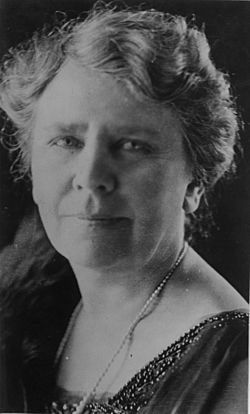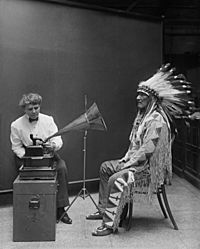Frances Densmore facts for kids
Quick facts for kids
Frances Densmore
|
|
|---|---|

Frances Densmore
|
|
| Born | May 21, 1867 Red Wing, Minnesota, U.S.
|
| Died | June 5, 1957 (aged 90) |
| Known for | Preservation of Native American culture |
| Scientific career | |
| Fields | Anthropologist, specializing as a Comparative musicologist ethnographer and ethnomusicologist |
| Institutions | Bureau of American Ethnology |
Frances Theresa Densmore (May 21, 1867 – June 5, 1957) was an American anthropologist and ethnographer born in Red Wing, Minnesota. Densmore is known for her studies of Native American music and culture, and in modern terms, she may be described as an ethnomusicologist.

Biography
As a child Densmore developed an appreciation of music by listening to the nearby Dakota Indians. She studied music at Oberlin College for three years. During the early part of the twentieth century, she worked as a music teacher with Native Americans nationwide, while also learning, recording, and transcribing their music, and documenting its use in their culture. She helped preserve their culture in a time when government policy was to encourage Native Americans to adopt Western customs.
Densmore began recording music officially for the Smithsonian Institution's Bureau of American Ethnology (BAE) in 1907. In her fifty-plus years of studying and preserving American Indian music, she collected thousands of recordings. Many of the recordings she made on behalf of the BAE now are held in the Library of Congress. While her original recordings often were on wax cylinders, many of them have been reproduced using other media and are included in other archives. The recordings may be accessed by researchers as well as tribal delegations.
Some of the tribes she worked with include the Chippewa, the Mandan, Hidatsa, the Sioux, the northern Pawnee of Oklahoma, the Papago of Arizona, Indians of Washington and British Columbia, Winnebago and Menominee of Wisconsin, Pueblo Indians of the southwest, the Seminoles of Florida, and even the Kuna Indians of Panama. Densmore frequently was published in the journal American Anthropologist, contributing consistently throughout her career. Her manuscript A Study of Some Michigan Indians (1949) was the first publication in the University of Michigan Press American Anthropologist monograph series.
She wrote The Indians and Their Music in 1926. Between 1910 and 1957, she published fourteen book-length bulletins for the Smithsonian, each describing the musical practices and repertories of a different Native American group. These were reprinted as a series by DaCapo Press in 1972.
She also was a part of "A Ventriloquy of Anthros" in the American Indian Quarterly along with James Owen Dorsey and Eugene Buechel.
Awards
Oberlin College awarded Densmore an honorary M.A. degree in 1924. Macalester College followed suit in 1950, awarding her an honorary Doctor of Letters degree. In 1954, the Minnesota Historical Society recognized her with its first-ever "Citation for Distinguished Service in the Field of Minnesota History."
The National Association for American Composers and Conductors recognized Densmore in its 1940-1941 awards for her musicological work.
See also
 In Spanish: Frances Densmore para niños
In Spanish: Frances Densmore para niños

